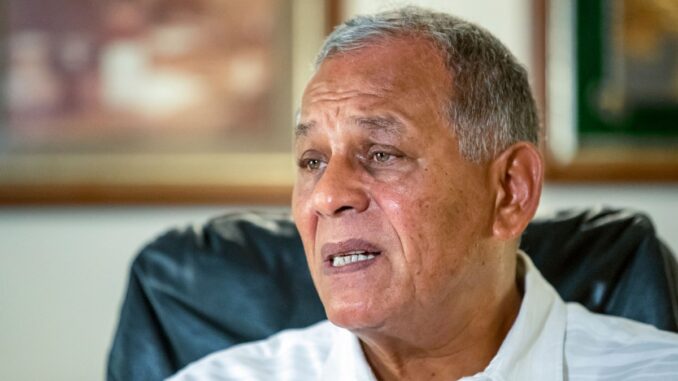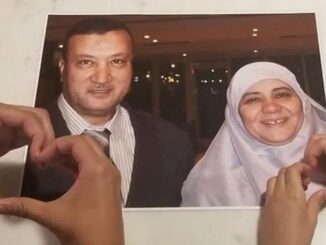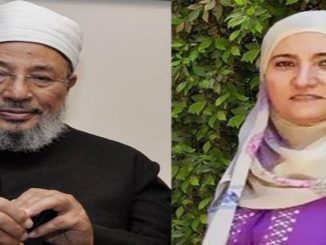
Late President Anwar Sadat’s nephew, Mohamed Sadat, seems to have recently become an unofficial negotiator on behalf of Egypt’s political prisoners, but seemingly with little success opportunities.
Recently a delegation was sent by Abdel-Fattah al-Sisi to Washington in order to polish his face and claim that there is an improvement in human rights, as evidenced by the launch of a fake strategy for human rights, faced great criticism of Egypt’s human rights file.
The delegation of Egyptian parliamentarians and politicians, headed by Mohamed Sadat, nephew of late Egyptian President Anwar Sadat, a few days ago concluded a visit to Washington that had aimed at discussing the human rights situation in Egypt, as announced.
In September, Egypt’s Abdel Fattah Al-Sisi announced a National Human Rights Strategy, a strategy criticized as an insincere effort meant to do little more than distract from Egypt’s abhorrent human rights record.
Some U.S. officials and elected representatives met with the delegation, headed by the newly appointed National Human Rights Council member and former parliamentarian Mohamed Anwar Sadat.
Al-Sisi’s delegation sought to convince the Americans of its importance in the Middle East, following its role in ending the war between the Palestinian resistance and the Israeli occupation last May, and its role in the files of Gaza reconstruction and the Palestinian prisoner crisis.
Senior American officials refused to meet with the delegation and sent the assistant secretary of state to meet with him.
Congressional representatives refused to meet with the delegation and issued statements calling on Egypt to lift repression, killing, arrests, and release detainees, and assured the delegation that there are no blank checks for the dictator.
However, it is not clear whether the US officials that met Sadat and his delegation, asked them about systemic human rights abuses in Egypt.
In fact, the US should ensure the Egyptian government understands that an empty public relations strategy devoid of serious human rights reforms will be met with rejection, suggests John Hursh, DAWN Program Director.
“Given the billions of dollars in military support the U.S. government provides Egypt, U.S. officials have a responsibility to ask this delegation tough questions about these systemic abuses and not to allow themselves to be misled by a well-coordinated, lobbyist-backed public relations campaign,” said John Hursh.
Meanwhile, the US State Department expressed its concerns about human rights to the Egyptian delegation.
The US State Department spokesman, Ned Price, “expressed American concerns about the human rights situation in Egypt, and confirmed in a press conference that the Acting Assistant Secretary of State for Near Eastern Affairs, Yael Lambert, met in Washington with members of “The Working Group of the International Dialogue Group in Egypt”.
Price pointed out that “the United States has concerns about human rights in Egypt and said we have expressed our concerns directly to the Egyptian authorities and on several occasions.”
“If the Egyptian government wants anyone to take its efforts to project a more responsible image seriously, the first thing it must do is release thousands of unjustly detained prisoners, who are facing grotesque torture and rampant abuses in Egyptian prisons,” Hursh added.
With the delegation’s arrival in Washington, the Egyptian government continues its attempts to obfuscate and whitewash its human rights abuses.
Since US President Biden took office, the Egyptian government has intensified its lobbying efforts in Washington. From hiring new lobbyists to promising the public that there are “no human rights violations in Egypt,” Sisi has worked hard to promote an image of Egypt that simply does not match its harsh reality.
However, Mohamed Sadat told AFP that he had been successful and was being listened to which had led to the cases of some prisoners being re-examined.
Some congressional representatives refused to meet with the Egyptian delegation, and 12 American and Egyptian organizations issued an extensive statement calling on congressional representatives not to meet with Sadat’s delegation and Mushira Khattab, which aims to polish Sisi’s face.
They said, “The Egyptian delegation led by Mohamed El-Sadat is visiting the United States to promote Abdel Fattah al-Sisi’s human rights record and polish his image, and what they are doing is a coordinated effort to improve Egypt’s image in the field of human rights, not in fact improving Egypt’s treatment of human rights.”
They emphasized that “Al-Sisi continues to imprison more than 60,000 political prisoners, execute political prisoners, and uses enforced disappearance to torture and kill detainees.”
In fact, there are an estimated 65,000 political prisoners in Egypt and the numbers look set to go up rather than down despite widespread, international criticism.
Egypt also holds family members of activists and journalists as hostages.
These retaliatory arrests are well documented with regard to the relatives of the journalist Moataz Matar, the artist Hisham Abdullah, the two activists Mona Al-Shazly and Ghada Naguib, the prisoner Abdel-Rahman Al-Shuwaikh, the poet Abdel-Rahman Youssef Al-Qaradawi, the Islamic preacher Dr. Youssef Al-Qaradawi, and the government minister Dr. Muhammad Mahsoub.
Egypt’s poor human rights record has been described in detail in the 2021 reports issued by the US State Department, Amnesty International and other reputable organizations.
Last week the We Record human rights organization uncovered that Sisi has built the largest prison in the country’s modern history, an indication that he intends to arrest many more people.
Since the military coup in 2013, Egypt’s prisons have been full of political dissidents, most of which have dared at some point to speak out about the severe human rights abuses taking place under the current government.
In 2016 the Arab Network for Human Rights Information said that Egypt had built 13 new prisons to house all the thousands of political prisoners that keep getting arrested.
Many have been kept in detention without trial, despite the two-year limit in place under Egyptian law. Often, as their two-year period is coming to an end, they are recycled onto new cases to prolong their detention.
Many prisoners are dying a protracted death due to the widespread and systematic denial of medical care in poorly ventilated cells with little sunlight and insufficient food.
Some prisoners have been released in recent months, but critics say it is just to appease criticism and does not indicate meaningful change as others have been detained at the same time.
Mohamed Sadat has previously called for the release of hundreds of activists who have been rounded up during anti-government protests.
The former lawmaker has also chaired the House of Representatives Committee on Human Rights and later resigned after accusing the government of not taking citizens’ complaints of abuse seriously.
He also criticized the parliament speaker and his two deputies after they received three armored cars worth over $1 million when austerity measures were being rolled out.
Sisi’s government has also seized on opportunities to appear useful to U.S. interests, even though these actions align with Egypt’s interests and further its strategic objectives as much as those of the United States.
The most instructive example is the credit the Sisi government received for facilitating a ceasefire between Israel and Hamas in May.
At the same time, Sisi’s government has avoided taking even the most tentative moves towards meeting any of the Seven Necessary Steps Egyptian human rights organizations have demanded to stop the country’s unprecedented decline in human rights.
“The Sisi government disregards all criticism and punishes all dissent, creating a society where people live in uncertainty and fear. U.S. officials and elected representatives should push back against these false narratives and disingenuous acts that serve to reinforce Sisi’s repressive status quo,” said Hursh.
“DAWN encourages dialogue between U.S. and Egyptian officials, but for these exchanges to be meaningful, they must include hard questions over Sisi’s human rights record and move past empty promises and unfulfilled actions,” Hursh added.
If Egypt is sincere in changing its image, it should make real changes in its human rights practices, releasing political prisoners, releasing hostages and halting executions.



